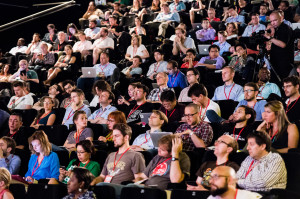Open Knowledge is a not-for-profit organization founded in 2004 dedicated to building tools, projects and communities that promote open knowledge in all its forms. It is a leader in this field nationally and internationally. It’s also a collaborative effort made up of open data and open knowledge enthusiasts around the globe led by a core team who report to a Board.
Our network’s activities are organized around local working groups and collaborative projects. Each of these initiatives has a different focus, but all are united by a common set of concerns and traditions related to the widespread sharing of data and knowledge across borders between groups as varied as academics, public servants, entrepreneurs, data experts, archivists, hackers and web developers.
See how data can change the world
A world where knowledge creates power for the many, not the few. A world where data frees us — to make informed choices about how we live, what we buy and who gets our vote. A world where information and insights are accessible — and apparent — to everyone. This is the world we choose.- Availability and access: the data must be available as a whole and at no more than a reasonable reproduction cost, preferably by downloading over the internet. The data must also be available in a convenient and modifiable form.
- Reuse and redistribution: the data must be provided under terms that permit reuse and redistribution including the intermixing with other datasets. The data must be machine-readable.
- Universal participation: everyone must be able to use, reuse and redistribute — there should be no discrimination against fields of endeavour or against persons or groups. For example, ‘non-commercial’ restrictions that would prevent ‘commercial’ use, or restrictions of use for certain purposes (e.g. only in education), are not allowed.
What kinds of open data?
There are many kinds of open data that have potential uses and applications:- Cultural: Data about cultural works and artefacts — for example titles and authors — and generally collected and held by galleries, libraries, archives and museums.
- Science: Data that is produced as part of scientific research from astronomy to zoology.
- Finance: Data such as government accounts (expenditure and revenue) and information on financial markets (stocks, shares, bonds etc).
- Statistics: Data produced by statistical offices such as the census and key socioeconomic indicators.
- Weather: The many types of information used to understand and predict the weather and climate.
- Environment: Information related to the natural environment such presence and level of pollutants, the quality and rivers and seas.
- Transport: Data such as timetables, routes, on-time statistics.
Why open data?
Why should data be open? The answer, of course, depends somewhat on the type of data. However, there are common reasons such as:- Transparency. In a well-functioning, democratic society citizens need to know what their government is doing. To do that, they must be able freely to access government data and information and to share that information with other citizens. Transparency isn’t just about access, it is also about sharing and reuse — often, to understand material it needs to be analyzed and visualized and this requires that the material be open so that it can be freely used and reused.
- Releasing social and commercial value. In a digital age, data is a key resource for social and commercial activities. Everything from finding your local post office to building a search engine requires access to data, much of which is created or held by government. By opening up data, government can help drive the creation of innovative business and services that deliver social and commercial value.
- Participation and engagement – participatory governance or for business and organizations engaging with your users and audience. Much of the time citizens are only able to engage with their own governance sporadically — maybe just at an election every 4 or 5 years. By opening up data, citizens are enabled to be much more directly informed and involved in decision-making. This is more than transparency: it’s about making a full “read/write” society, not just about knowing what is happening in the process of governance but being able to contribute to it.
The Open Data Handbook
For a more complete look at open data including a detailed guide on how to open it up and a glossary of key terms download a PDF of the Open Data Handbook or read it online .Ambassadors for OKFN, India:
Sridhar Gutam:
Earned a Ph.D. in Plant Physiology from Indian Agricultural Research Institute, New Delhi and joined Agricultural Research Service in January 2004 and now working on Mango at Central Institute for Subtropical Horticulture, Lucknow. Has P.G. Diploma in Patent Laws. The latest global movements on FOSS, BiOS and Open Access created interest on IPR, Patents, Open Access and Free and Open Source Agricultural Biotechnology. Currently also the Joint Secretary of Agricultural Research Service Scientists’ Forum.


